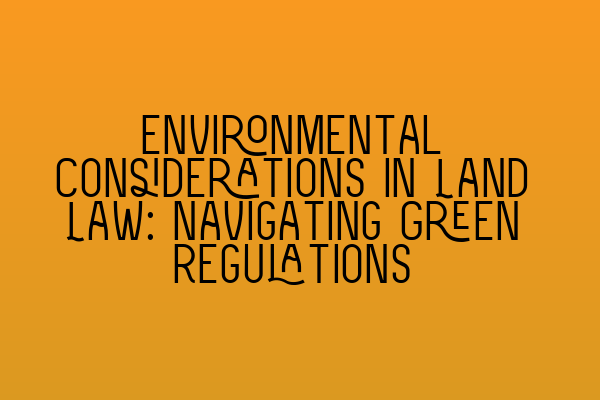Environmental Considerations in Land Law: Navigating Green Regulations
In today’s world, environmental concerns are at the forefront of many discussions and initiatives. With increasing awareness and legislation surrounding sustainable practices, it’s crucial for property law practitioners to understand and navigate the environmental considerations in land law. As a solicitor at SQE Property Law, I understand the importance of staying up-to-date with the ever-evolving green regulations that impact land transactions. In this blog post, we will explore the key environmental considerations in land law and provide guidance on navigating these green regulations.
1. Environmental Impact Assessments (EIAs)
When dealing with land development and planning permission applications, it is essential to consider the environmental impact of the proposed project. An Environmental Impact Assessment (EIA) is a process that evaluates the likely environmental effects of a development, taking into account factors such as pollution, biodiversity, and air quality. This assessment helps ensure that any potential negative impacts are identified and mitigated. To learn more about the legal aspects of misrepresentation in contracts, read our article on Misrepresentation in Contracts: Unveiling Deceptive Practices.
2. Environmental Permits and Licensing
Certain activities, such as waste management or water abstraction, require environmental permits or licenses to ensure compliance with environmental regulations. As a property law practitioner, it is crucial to advise clients on the necessity of obtaining the appropriate permits and licenses before engaging in such activities. Failure to do so can result in legal penalties and damage to the environment. To learn more about landmark cases and influential judicial decisions in contract law, check out our article on SQE Contract Law: Analyzing Landmark Cases and Influential Judicial Decisions.
3. Flood Risk Assessments
In recent years, the frequency and severity of floods have increased, highlighting the importance of considering flood risk when dealing with land transactions. Flood Risk Assessments (FRAs) help identify areas at risk of flooding and assess the potential impact on proposed developments. Being knowledgeable about flood risk regulations and advising clients accordingly is crucial in protecting their interests and ensuring compliance with environmental laws.
4. Energy Efficiency and Sustainability
As part of the global movement towards greener practices, energy efficiency and sustainability have become significant considerations in land law. Buildings are responsible for a significant portion of global carbon emissions, making it essential to prioritize energy-efficient designs and practices. Understanding the requirements of energy performance certificates and advising clients on sustainable building methods can have a positive impact on both the environment and their bottom line.
5. Protected Areas and Conservation
When dealing with land transactions, it is essential to identify any protected areas and conservation designations that may restrict development activities. These areas include Sites of Special Scientific Interest (SSSI), National Parks, and Areas of Outstanding Natural Beauty (AONB). Familiarizing oneself with the regulations surrounding these protected areas will help avoid legal issues and ensure compliance with environmental laws. To gain a better understanding of contractual capacity rights and limitations, we recommend reading our article on Understanding Contractual Capacity: Rights and Limitations.
6. Waste Management and Contamination
Dealing with waste management and contamination issues is a crucial aspect of environmental considerations in land law. Before purchasing or developing a property, it is necessary to assess any potential contamination and plan for appropriate remediation measures. Understanding the legal obligations surrounding waste management and advising clients on proper waste disposal practices will not only comply with regulations but also minimize the impact on the environment.
7. Engaging in Continuing Professional Development (CPD)
As a property law practitioner, staying up-to-date with changes in environmental regulations is essential. Engaging in Continuing Professional Development (CPD) opportunities, such as webinars and training sessions, will ensure that you have the latest knowledge and insights to guide your clients effectively. Joining our SQE Contract Law webinars will provide you with expert insights and guidance on various aspects of environmental considerations in land law. Check out our upcoming webinars on Join Our SQE Contract Law Webinars: Expert Insights and Guidance.
In conclusion, navigating the environmental considerations in land law is a vital part of practicing property law effectively. By understanding and advising clients on issues such as environmental impact assessments, permits and licensing, flood risk assessments, energy efficiency, protected areas, waste management, and engaging in CPD opportunities, you can ensure compliance with green regulations and protect both your clients’ interests and the environment. To test your knowledge of contract law, take advantage of our interactive SQE mock tests for contract law available at Interactive SQE Mock Tests for Contract Law: Test Your Knowledge. Stay informed, stay compliant, and contribute to a greener future.
